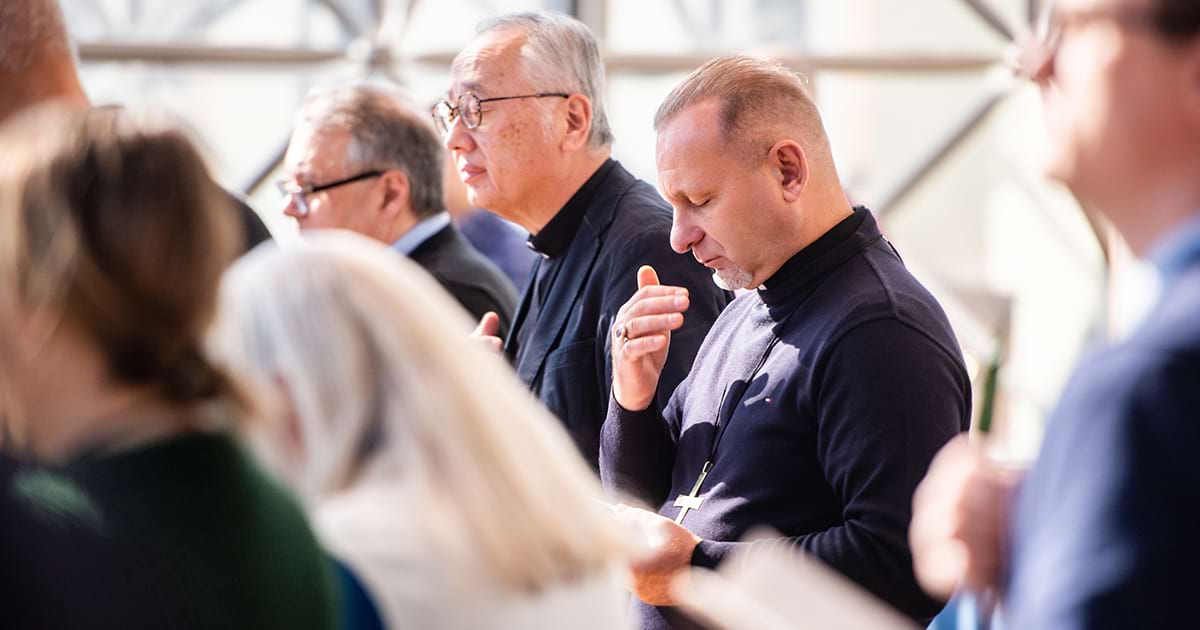
The Lutheran Church—Missouri Synod (LCMS) Commission on Theology and Church Relations (CTCR) convened in St. Louis Feb. 16–18 for its quarterly meeting. With a deadline looming for submissions to the 2023 LCMS convention, the 20-member Commission was able to conclude much of its work for the current triennium.
The meeting featured a visit from the Rev. Serge Maschewski, bishop of the Evangelical Lutheran Church of Ukraine (ELCU), to discuss the potential for fellowship between the ELCU and the LCMS. Maschewski had been scheduled to meet with the CTCR in December, but ongoing fighting in the war between Ukraine and Russia prevented him from traveling. After a presentation by Maschewski to the Commission and further discussion with a CTCR subcommittee charged with evaluating church relations requests, the CTCR unanimously approved a motion to memorialize the 2023 convention to recognize fellowship with the ELCU.
In addition to recommending fellowship with the ELCU, the CTCR has, during the current extended triennium, recommended fellowship with several other church bodies, including the Evangelical Lutheran Mission Diocese of Finland (ELMDF), the Evangelical Lutheran Church of South Sudan/Sudan (ELCSS/S), and the Lutheran Church of Uganda (LCU). These overtures were approved at the February meeting. The Commission also approved a recommendation from the LCMS Board for International Mission to recognize fellowship with the Ceylon Evangelical Lutheran Church (CELC) of Sri Lanka, a mission of the LCMS that has now become an independent church body.
“Alongside our many responsibilities in the realm of theology, church relations is the other principal component of the CTCR,” said the Rev. Dr. Joel Lehenbauer, CTCR executive director. “Since its inception in 1962, the Commission has been tasked with assisting the Synod president in his relationships with other church bodies.”
The other major item on the Commission’s agenda in February was the completion of its convention report, which details the CTCR’s activities throughout each triennium. The theology portion of the report addresses the many reports, opinions, studies, responses and evaluations produced in the last four years. The church relations component describes the relationships with other church bodies, including policy and bylaw changes, approved requests for fellowship, and theological conversations with church bodies not in fellowship with the LCMS.
In addition, as part of its convention report, the Commission unanimously adopted a statement concerning its recently published Luther’s Large Catechism with Annotations and Contemporary Applications. That statement is available here.
Founded in 1962 as successor to five other committees of the Synod, the Commission as currently constituted by the Synod consists of 20 members. The 16 voting members include five elected by the convention, four appointed by the two LCMS seminaries, four appointed by the LCMS Council of Presidents, and three appointed by the Synod president. The presidents of the two seminaries, along with the Synod president and first vice-president, are ex-officio advisory members.
“The Commission has worked exceptionally hard these last four years, despite the challenges many of us faced during the pandemic,” said the Rev. Dr. Lawrence Rast, president of Concordia Theological Seminary, Fort Wayne, who serves as CTCR chairman. “We were able to complete nearly of all the assignments on our agenda, and we look forward to new assignments from the convention this summer.”
In addition to its major reports and its consideration of fellowship requests, the CTCR evaluates fraternal organizations and other new religious movements, monitors developments in areas of social concern (such as bioethics), and responds to requests for theological opinions from Synod officers (e.g., the president and district presidents) and official entities of the Synod. The Synod bylaws charge the Commission with offering bylaw-mandated opinions as part of the dispute resolution process and responding to expressions of dissent from the doctrinal positions of the Synod. At the request of the convention or the Synod president, the CTCR also assists in various task forces and participates in conversations with other church bodies. More information, including the Commission’s documents, may be found at lcms.org/ctcr.
Posted Feb. 22, 2023